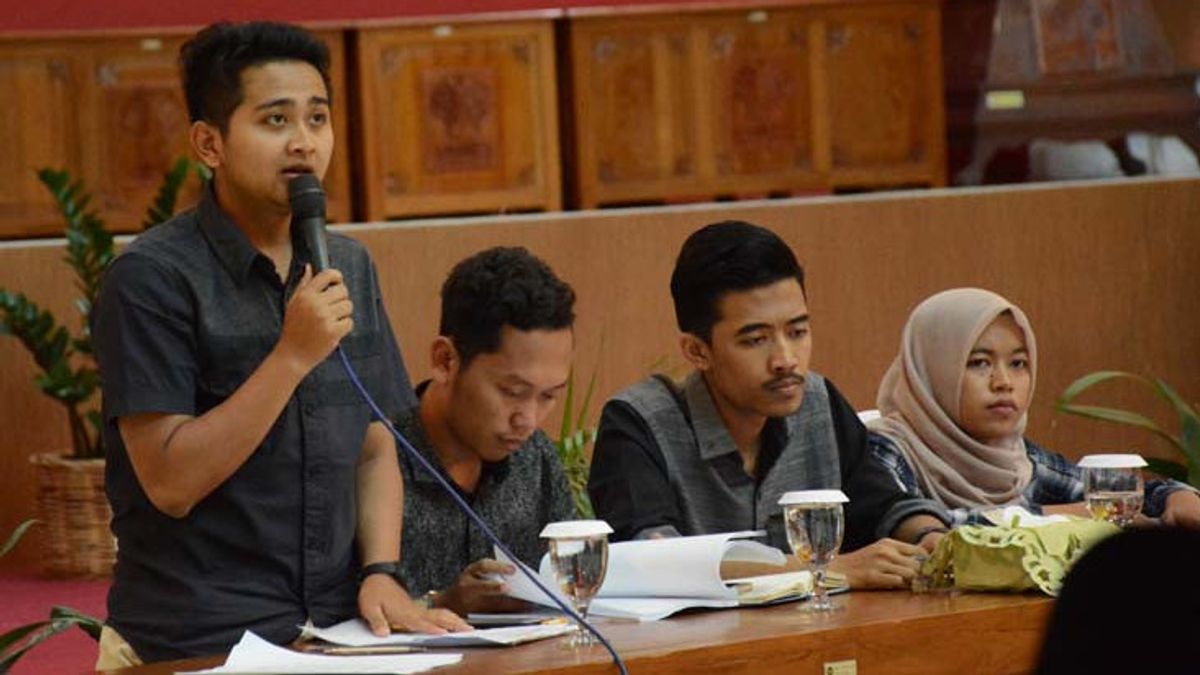JAKARTA - A viral video recorded by a lecturer at UIN Syarif Hidayatullah, Zubair, comparing Nahdlatul Ulama (NU) and Muhammadiyah has sparked a debate. One of them is about students recording. Because, instead of expressing his opinion in academic forums, he actually giggled while swearing. This is like showing the iceberg phenomenon about many students who stutter in expressing their opinions.
In the video, Zubair argues that the Asyariyah faith has many problems so that those who follow it will fall into ignorance. "Not productive, not progressive, not innovative, not creative. Making people stupid, making people backward, that's Asyary," said Zubair to his students. Zubair spoke about this during an online class for Islamic studies at the Faculty of Adab and Humanities, UIN Jakarta.
While talking about it, a student recorded it and heard the sound of him laughing. Instead of expressing her disagreement with the lecturer's statement, the student actually went viral.
Netizens deplore those students who do not reflect his attitude as an academic. In fact, a student must be able and brave in expressing an opinion. Especially in the context of Zubair, it happened in academic forums.
Ehhhhh, is this really your Lecturer? @uinjktofficial What do you mean? pic.twitter.com/GXzpUqf6NT
— Amrudin Nejad (@amrudinnejad_) November 2, 2021
Because it had gone viral and caused debate, Zubair finally apologized. In a video Zubair said he was sorry for hurting some of the parties involved in his statement.
"I convey my sincere apologies to Muslims, especially the NU big family because my mistakes and negligence have hurt their hearts and feelings. Also to the Muhammadiyah big family because their carelessness has disturbed their peace by comparing them to the NU big family," said Zubair.
"silent" cultureA student should be able to express his thoughts. Because it becomes the basic capital of an academic to convey their ideas, ideas, and innovations. It is appropriate that educated people are able to think critically. But unfortunately, it seems too idealistic.
Quoting Lenin Iyer's research entitled Critical Thinking and it's Importance in Education, critical thinking not only describes the ability to think according to the rules of logic and probability, but also the ability to apply these skills in real terms. In addition, critical thinking gives a person the opportunity to be objective, reduce emotions, and be more open-minded when looking at the views and opinions of others.
The difficulty of students to debate or express opinions is inseparable from the culture of campus education in Indonesia. There are still many who apply the one-way education method.
For example, the teacher who only teaches knowledge, but does not invite students to think critically or think critically. Even if they end up criticizing, not a few campus parties often call or punish the student. It can be seen that both the students and the campus cannot apply critical thinking at all.

This phenomenon was confirmed by the Coordinator of the Indonesian Education Observer Network (JPPI), Ubaid Matraji. To VOI, Ubaid explained that the campus is actually a free world.
According to Ubaid, the silence that often occurs is what makes students reluctant to argue with lecturers. Not to mention there are several cases for students who argue that lecturers will be given bad grades.
"Students should be invited to reason, open dialogue, that must be grown. But what happened instead was a razor blade of policy. The Ministry of Research and Technology makes students more absorbed in industrial machines, not how students are invited and sharpened their critical reasoning. So the debate in class does not become a debate because it will only be in quotes, a laughing stock," said Ubaid.
Therefore, when a student saw that his lecturer did not agree with him or did not agree with him, he decided not to argue with him. Instead of debating in class, students prefer to upload it on social media because it is much more free to express their opinion.
"Meanwhile, on campus, students are worried that if they argue, they will be given bad grades. Because there have been many incidents like that," said Ubaid.
In the context of the viral UIN Zubair lecturer, not a few netizens considered students who went viral on social media teaching materials to be unethical. But Ubaid did not agree. According to him, what is discussed on campus or in class is very worthy of being discussed publicly. This is because what is debated or discussed by lecturers, students, or the academic community is something scientific.
"In the campus context, (debates/discussions) are based on argumentation, there is evidence based whether based on research, theory or new theses that have been found. So what is conveyed by lecturers can be debated by anyone," concluded Ubaid.
*Read other information about EDUCATION or read other interesting articles from Ramdan Febrian Arifin.
Other BERNASThe English, Chinese, Japanese, Arabic, and French versions are automatically generated by the AI. So there may still be inaccuracies in translating, please always see Indonesian as our main language. (system supported by DigitalSiber.id)













